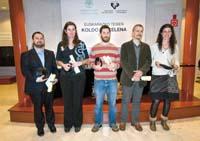“I am pleased to think that it will benefit society”
2016/09/01 Galarraga Aiestaran, Ana - Elhuyar Zientzia Iturria: Elhuyar aldizkaria
 400
400
Olatz Pérez de Viñaspre Garralda wanted to be an informer from a young age. He liked computers very much and from the ESO he intended to study computer science. However, in the last year of Baccalaureate there was doubt that Basque Philology also attracted. “I thought I could later study Philology, and so I decided to start at the Computer Science Faculty of San Sebastian. And in the end I have combined both thanks to the IXA team,” says Pérez de Viñaspre.
In fact, the IXA group is doing its thesis, with a research framed in a project of automatic translation of English medical terminology into Basque. The path to access has been “very natural”: “While I was studying computer science, I met some teachers from the IXA group and I did the final project with Maite Oronoz. Then I related it to another project and then I did the Master in Language Analysis and Processing. Then the opportunity arose to do the thesis, so everything has come one after another.”
In the words of Pérez de Viñaspre, the IXA group has collaborated a lot on this tour and has also addressed Maite Oronoz. This has meant a change in the research topic: “I did both projects around question-response systems, and now I am doing the thesis in the medical field. I was clear that I wanted to do the thesis with the Basque language, who wanted to be a director, and since he worked in the field of health, I also started to do it.”
Thus, the semantic network SNOMED CT is now working on translation into Basque. “This semantic network is used worldwide to process health reports, etc. and is multilingual. Therefore, if we wanted to do something in this area, the first thing we had seen was to translate the SNOMED CT into Basque, and we are doing it.”
Momentum to move forward
Recognize that you are really doing it: “I am very pleased to think that what I am doing will benefit society.” In addition, he likes that his work has a correct application, “that it is useful, that it does not remain on paper”. All this pushes forward.
In addition, it considers very important the support of the group: “After all, we spent many hours working and sometimes it’s hard. We also have moments of despair, and to overcome them, I find it essential to help the team.”
Now it is in the final line of the thesis. The work he has done is the first step of the whole project and the final objective is to offer doctors the possibility of writing medical reports in Basque. As Pérez de Viñaspre explained, “now you can’t write only in Basque, being monolingual doctors without endangering the patient’s safety. They must also be in Spanish. Therefore, our goal is to create a program that helps to write reports in Basque and also to translate them automatically into Spanish or other languages.”
After the thesis, I would like to continue working in the IXA group, but combining it with the teaching work to have greater stability. Nor does he refuse to go abroad, two years after graduation, since those of other minority languages are interested in his work, “but I would like to stay.”

Gai honi buruzko eduki gehiago
Elhuyarrek garatutako teknologia




